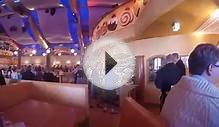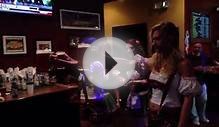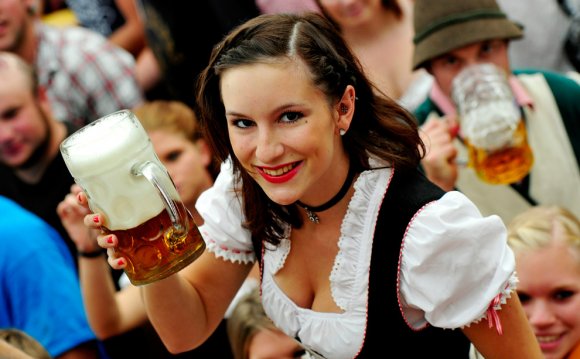
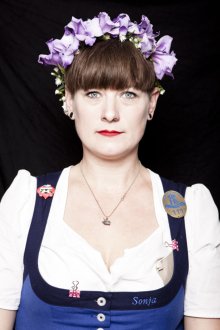 Just wrapping up her fifth year of waitressing at the fall fest—which draws more than six million visitors to Munich during the 16-day celebration each year—Herpich is basically a pro on all things Oktoberfest. Not only does she masterfully carry those heavy Maß beer mugs and navigate and appease the crowds each year, she also documents her experiences in a self-portrait series, taking photos each morning and evening of the fest. We spoke to her shortly after the festival closed on Sunday to get the scoop on this year’s fest, life as an Oktoberfest beer maid, and end of fest celebrations.
Just wrapping up her fifth year of waitressing at the fall fest—which draws more than six million visitors to Munich during the 16-day celebration each year—Herpich is basically a pro on all things Oktoberfest. Not only does she masterfully carry those heavy Maß beer mugs and navigate and appease the crowds each year, she also documents her experiences in a self-portrait series, taking photos each morning and evening of the fest. We spoke to her shortly after the festival closed on Sunday to get the scoop on this year’s fest, life as an Oktoberfest beer maid, and end of fest celebrations.
MUNCHIES: So, Oktoberfest just wrapped up. How did it go?
Sonja Herpich: Today I am very tired. During Oktoberfest, we all have the feeling that it’s pretty easy; we aren’t getting sick or anything. And then when you have a break like today, then you start to feel your body is very run down, and there is pain in the legs and cramps in the muscles.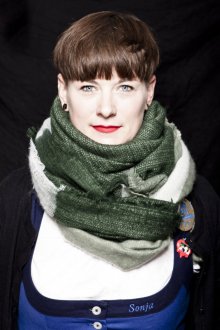 But this year we were so good in our organization that we all thought it was kind of an easy year; there was not that much drama with our guests and I had the feeling that people were more kind this year.
But this year we were so good in our organization that we all thought it was kind of an easy year; there was not that much drama with our guests and I had the feeling that people were more kind this year.
How did you get started working at Oktoberfest?
Around 15 years ago, I worked selling pretzels after school. I like doing jobs like that—working hard in crowded places. I wanted to do something like that again, but not selling pretzels or souvenirs. And then on a photo shoot, I met a food stylist who’s also an Oktoberfest waitress. We talked about Oktoberfest and I told her this was a wish for me, to work there. And then she thought about it, and I met the other girls, and that was my way to come into the team.
And what made you interested in doing it?
For me, it’s a kind a self-experience. Some people hike through the Alps to find how far they can go, to discover “Am I able to do that or not?” Oktoberfest is something like that for me. Am I able to do it? Am I strong enough? These are the questions each year. Being a photographer, you think all the time, “Should I take the picture from this side or that side?” No one tells you, “Now it’s done.” You have to have the right feeling the picture is done.
Being a photographer, you think all the time, “Should I take the picture from this side or that side?” No one tells you, “Now it’s done.” You have to have the right feeling the picture is done.
At Oktoberfest, it’s just easy work. I don’t need my brain there. It doesn’t matter if I bring the beer from the right side or the left side. I only bring beer and it’s pretty easy. For my brain, it’s kind of a holiday. It’s a kind of auszeit, a break time of your normal life.
What is a typical day like?
The hardest days are on the weekend. We have to start around 8 or 9 in the morning, and when we come to the tent there are hundreds of people waiting for the doors to open. We go in and everything is empty and cold, and we prepare our service, cleaning the tables. A half an hour later, the security guys open the doors, and then people are freaking out, running into the tent, screaming, looking for tables, and celebrating that they have a table. We stand on the sides and look at what’s going on, at what happens, and then we start to sell beer around 9 or 10. It’s a lot of work to bring the first round of beers to all the people, and then, yeah, you start to make them drunk. [Laughs] The whole day you are doing the same, selling beer and selling food. People are standing around everywhere, people dancing, screaming, jumping, and you have to figure it out, move through the people. Everyone wants to have your beer. You have to protect everything, all your pockets; you can’t leave anything unattended.
RELATED VIDEO
